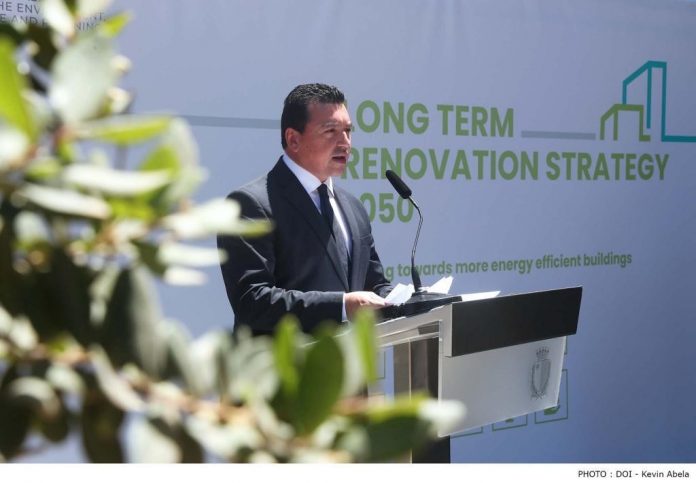The Long Term Renovation Strategy (LTRS) – a key action of Malta’s efforts for more energy-efficient use of buildings to move towards the decarbonisation of the building stock – is being published for public consultation.
This was announced by the Minister for the Environment, Climate Change and Planning Aaron Farrugia and Parliamentary Secretary for Construction Chris Agius.
Minister Farrugia announced that government aims to invest millions of euro in the next ten years both in the form of grant schemes as well as by investing in renovating its public buildings to reduce consumption in residential buildings by 40% and by 36% in non-residential by 2050. This also aims to achieve a reduction in carbon emissions from buildings, to move towards carbon neutrality.
Schemes include energy efficiency packages for both dwellings and industry, a deep renovation scheme, and incentives to promote energy generation in buildings. Proposed actions also include information campaigns, schemes for energy consultancy for voluntary organisations, schemes for domestic energy advisory services, and the implementation of energy management systems in public buildings.
“Conserving energy by lowering the energy requirements in buildings is a win-win situation. It pays the end-consumer and decreases the demand for energy generation, hence reducing emissions. This strategy addresses this topic listing the most cost-effective approaches to improve energy efficiency. It encourages renovation and the uptake of modern technology as well as promoting renewable energy sources”, said the minister, adding that this strategy goes hand-in-hand with a number of strategies and initiatives which will lead to a carbon neutral economy.
Minister Farrugia explained that the LTRS is the strategic framework for the Maltese Government for the renovation of the building stock over a 30-year period from 2020 to 2050. “The draft strategy tackles the transition towards more sustainable buildings in Malta from a wider perspective. It recognises the challenges faced and is designed in a manner to support the strengthening of a governance structure based on the newly set-up authority – the Buildings and Construction Authority”, continued the minister.
He then went on to say that, “Government intends to lead by example, and the draft strategy manifests such commitment as it focuses also on the implementation of more energy efficient management systems in public building”.
Parliamentary Secretary Chris Agius said that one forecasts that the amount of energy to be saved will be around 17,700 GWh and 26,500 GWh from dwellings and non-dwellings by the year 2050. Together with other changes, this is expected to lead to a reduction of between 2.8 and 4.6 million tonnes of CO2 by 2050.
Other benefits associated with this strategy are a reduction in energy bills and a lessened financial burden on our families, and a reduction in associated health risks. He said that studies show that for every million euro invested in energy efficiency, 8 to 27 jobs are created every year. Linked to the projected estimate in this strategy results in around one thousand and 5,500 jobs per year in the construction and energy services sectors. The parliamentary secretary concluded by saying that he looks forward to these steps being implemented for the benefit of all.










